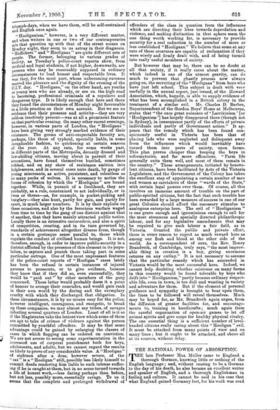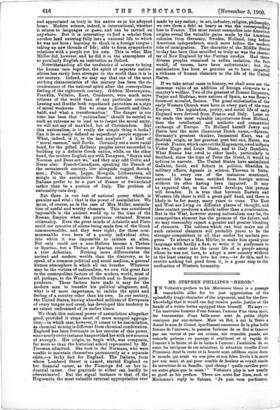THE NATIONAL POWER OF ABSORPTION. T HE late Professor Max Muller
came to England a thorough German, knowing little or nothing of the English language ; and, without ceasing to be a German to the day of his death, he also became an excellent writer and speaker of English, and a thorough Englishman in feeling and culture. It cannot be said in his case that what England gained Germany lost, for his work was read
and appreciated as truly in his native as in his adopted home. Modern science, indeed, is international, whether it relates to languages or gases, and can be carried on anywhere. But it is interesting to find a scholar from another land. entering fully into a national life to which he was not born ; learning to think in a foreign tongue ; taking up new threads of life ; able to form sympathetic relations with a people not his own. This is what Max Muller did, however, and he did it in the atmosphere of so peculiarly English an institution as Oxford.
Notwithstanding all the tendencies of science to bring the human race together, the spirit of separate nation- alities has rarely been stronger in the world than it is in our century. Indeed, we may say that one of the most striking characteristics of the century has been the re- crudescence of the national spirit after the cosmopolitan feeling of the eighteenth century. Gibbon, Montesquieu, Franklin, Voltaire, Kant, Condoreet, were much more citizens of the world than of any particular country. Lessing and Goethe both repudiated patriotism as a sign of moral weakness. But we come to Kossuth and Gari- baldi, and what • a transformation ! The danger in our time has been that "nationalism" should be carried to such an extreme as to lead us to forget the moral unity, we will not say of mankind, but of Christendom. But this nationalism, is it really the simple thing it looks ? Can it be so easily defined as superficial people suppose ? What, indeed, is it, in the last analysis ? A kind of "moral essence," said Burke. Certainly not a mere racial bond, for the gifted Hellenic peoples never succeeded in building up a definite Greek nation, while, on the other hand, the modern English say with Tennyson, "Saxon and Norman and Dane are we," and they may add Celtic and Norse also. French-Canadians, speaking the French of the seventeenth century, live alongside rugged Scotch- men ; Poles' Russ, Lapps, Mongols, Lithuanians, all mingle in the assimilative Russian nation. Genuine Italians prefer to be a part of France or Switzerland rather than be a portion of Italy. The problem of nationality cuts deep.
But there is one test of national power which is genuine and vital ; that is the power of assimilation. We mean, of course, as in the case of Max Muller, assimila- tion of useful and worthy elements. This was considered impossible in the ancient world up to the time of the Roman Empire when the provinces obtained Roman citizenship. Even the great minds of Aristotle and Plato could not conceive of aliens being made free of the Greek
commonwealths, and they were right ; for those com- monwealths were born of a purely individual ethos,
into which it was impossible to initiate an alien. Not only could not a non-Hellene become a Theban or Spartan, but a Theban or Spartan could not become
a true Athenian. Nothing more differentiates the ancient and modern worlds than the discovery, so to speak, of a common political and social medium' a general human atmosphere in which all can breathe. Whatever may be the virtues of nationalism, we owe this great fact to the cosmopolitan factors of the modern world, most of all, perhaps, to the Western Church and to Roman juris- prudence. These factors have made it easy for the modern man to transfer his political allegiance, and, what is of more importance, to imbibe the spirit and feeling of a country, other than his own. In our century, the United States, having absorbed millions of Europeans of every tongue and creed, has developed this tendency to an extent undreamed of in earlier times.
We think this national power of assimilation altogether good, provided it stops short of mere mongrel aggrega- tion,—in which case, however, it ceases to be assimilation, as chemical mixing is different from chemical combination. England has been fortunate in her exercise of this power, since nearly every instance has provided her with new sources of strength. Her origin, to begin with, was composite, far more so than the historical school represented by Mr. Freeman admitted. She took in the Normans, who were unable to maintain themselves permanently as a separate caste,—a lucky fact for England. The Italians, from whom Lombard Street is named, started England on her financial career, as the Flemings did on her in- dustrial career. Our gratitude to either can hardly be overestimated. But the signal instance is that of the Huguenots, the most valuable external appropriation ever
made by any nation ; in art, industry, religion, philosophv we owe them a debt as heavy as was the correspondnig! loss to France. The most recent researches into Arne/ice/1 origins reveal the valuable gains made by the American colonies from Germany, Sweden, Holland, long before American independence, much more before the modern tide of immigration. The character of the Middle States to-day has been thus moulded as truly as was the charac- ter of New England by the Puritan exodus. Had these diverse peoples remained in sullen isolation, the fact would, of course, have been unfortunate ; but the assimilation has been so genuine as to have imparted a richness of human elements to the life of the United States.
If we take actual cases in history, we shall soon see the immense value of an addition of foreign elements to a country's welfare. Two of the greatest of Roman Emperors, Trajan and Hadrian, were natives of Spain, as was Rome's foremost moralist, Seneca. The great ecclesiastics of the early Western Church were born in every part of the vast Empire. The legislation, poetry, and social life of early England were derived from France and. Italy. Later on we made the most valuable importations from Holland, then the intellectual and esthetic and commercial exchange of Europe. To Holland herself Jewry and Iberia lent the most illustrious Dutch na.me,—Spinoza. Germany's greatest thinker, Immanuel Kant, was of Scottish origin, as her greatest poet but one, Heine, was Jewish. France, which cast out the Huguenots, owed to Spain Victor Hugo and Louis Blanc, and to Italy Gambetta. What Russia has owed to other lands, particularly to Scotland, since the time of Peter the Great, it would be tedious to narrate. The United States have assimilated Gallatin, Soule, and Schurz in politics, Sheridan in military affairs, Agassiz in science, Thoreau in litera- ture. In every one of the instances mentioned, national life has been enriched from foreign sources without its ethos having been impaired. It may be expected. that, as the world develops, this process will broaden. It is true that between Eastern and Western life there is still a great gulf fixed, and there is likely to be for many, many years to come. The East and West are living on different planes of thought, and their contact produces a shock rather than a combination. But in the West, however strong nationalism may be, the cosmopolitan element has the promise of the future, and we may reasonably expect a greater and greater blending of elements. The nations which can best make use of such external elements will probably prove to be the stronger competitors in all that makes for modern pro- gress. To attract a Max Muller, to make him speak your language with hardly a flaw, to write it in preference to his own, to enter into the inner life of a people among whom he was not born, to adopt a new country without in the least ceasing to love his own,—to do this, and to receive nothing but good from it, is a great step to the unification of Western humanity.























































 Previous page
Previous page